All telegraphic stationery.
- Australia 1901-1988
- New South Wales
- Overview of NSW
- Telegraph lines
- Telegraph Offices
- Date stamps
- Forms
- Envelopes
- Instructional annotation
- Collect
- Delayed
- Free
- Immediate Urgent
- Reply paid
- Rates
- Stamps
- 1871 Telegraph stamps
- 1885 proposal
- 1893 proposal
All telegraphic stationery issued by Victoria during the Interim period (1901-1917) can be accessed from this page:
- transmission forms (ordinary rate);
- transmission forms (urgent rate) - none issued;
- delivery forms (ordinary rate);
- delivery forms (urgent rate);
- delivery envelopes (ordinary rate);
- delivery envelopes (urgent rate);
- reply paid forms;
- Money order telegrams.
All Interim forms had the heading COMMONWEALTH OF AUSTRALIA and a reference to VICTORIA.
Transmission forms (ordinary rate).
The Age of 25 June 1902 reported that
"It is announced in the new postal regulations that henceforth books of telegraph forms will not be supplied to the public free of charge. The forms have been shamefully misused and wasted and the Department has decided in the future to charge 1/- for each book of 100 forms. It is doubtful however whether this plan will prove satisfactory. Firms or persons that really require telegraph forms are not likely to use the books supplied to them in place of memorandum forms or notepaper and the charge for the books will certainly not prevent anyone from obtaining writing or scribbling paper free of charge. All a person will have to do in the future is to walk into the Telegraph Office and take a few hundred forms out of the large number that are always placed on the tables for the use of the public".
| VI-TO-1.
Printed in red on white paper. Very plain form with a vertical column of three boxes for stamps on the right side below a pointing hand. |
 |
|
Printed on white paper - perhaps with a serration at the left (from a book?). Has a row of eight boxes with blank boxes at either end of the row for affixing stamps. Very similar to the corresponding NSW form NI-TO-1. |
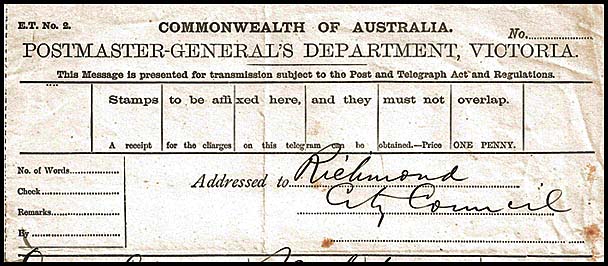 |
| VI-TO-3.
Printed on white paper. Has a row of eight boxes with the centre six boxes for affixing stamps:
|
 |
| VI-TO-4.
The boxes at either end of the row for affixing stamps contain "Telegraph Charges" and "Date Stamp" respectively.
|
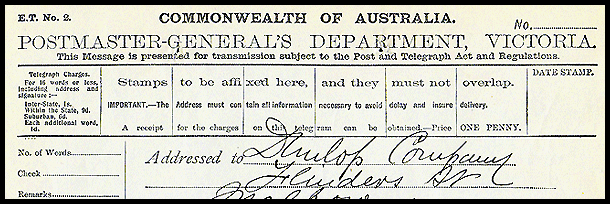 |
Transmission form (Urgent rate).
| VI-TU-1.
Printed on pink paper. Heading section is moved to the right. Has telegraph charges in a box. Information about charges for a receipt located between heading and message area. |
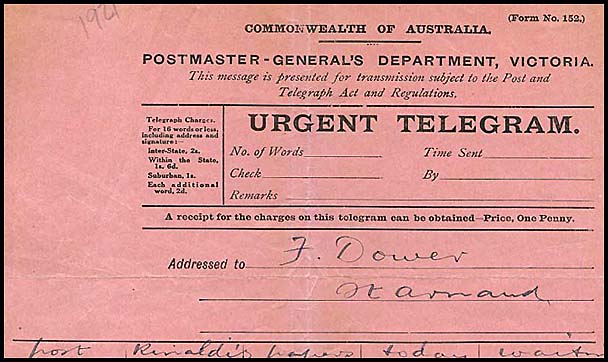 |
| VI-TU-2.
Printed on orange paper. Has a row of eight boxes with blank boxes at either end of the row for affixing stamps. |
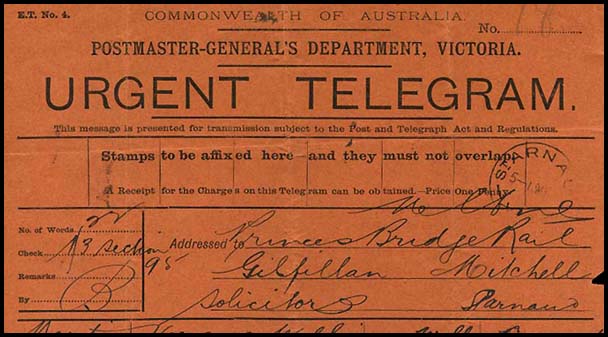 |
Delivery forms (ordinary rate).
Three formats were used for the ordinary rate delivery forms during this short period in Victoria although there were many variations within each format - especially for Form DO-2.
| VI-DO-1.
Heading is Has four vertical lines of text at left. |
 |
| VI-DO-2.
Heading is Printed in red on yellow paper. |
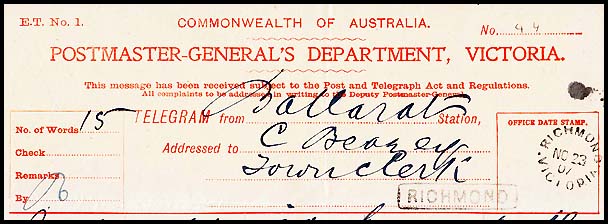 |
| VI-DO-3.
The usual Interim period heading. Has two vertical lines of text at left. Later printings had TELEGRAM in serif font centered at the top. Printed in blue on cream paper. |
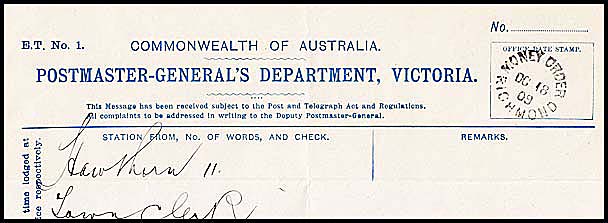 |
| VI-DO-4.
An experimental form. Has TELEGRAM in a large box above the usual Interim period heading.
|
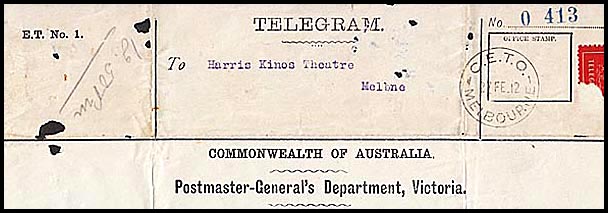 |
|
The usual Interim period heading. Has two lines of vertical text at the left. Printed in black on white paper. |
 |
| VI-DU-1.
Heading in three lines. Boxes on both sides under heading and for message. No schedule number but a stores number at base. |
 |
| VI-DU-2.
Heading in three lines. Message area has six lines. Schedule number below heading at the left.
|
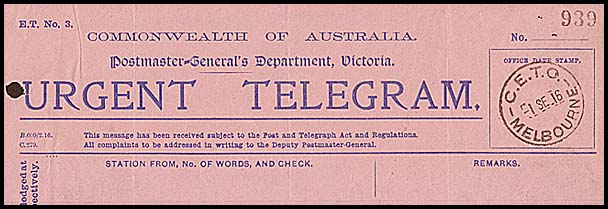 |
| VI-RO-1.
Printed on dark green paper. Heading has POST OFFICE TELEGRAPHS VICTORIA similar to VI-DO-1 above. Message area is boxed. Four lines of vertical text at left. Two parts separated horizontally by serrations. Complete form unknown. |
 |
| VI-RO-2.
Printed on light green paper. Heading is the standard Interim format. Message area is boxed. No lines of vertical text at left. Two parts separated horizontally by serrations. Complete form unknown. |
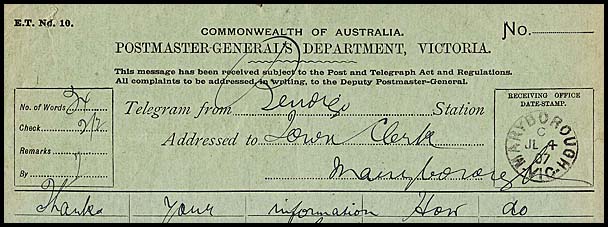 |
| VI-RO-3.
Printed on pale green paper. Heading is the standard Interim format. Message area has thin lines and occupies 66% of the form. Two lines of vertical text at left. Two parts separated horizontally by serrations. Complete form unknown. |
 |
| VI-MO-1.
Standard Interim heading. Sub-heading has Receipt to .... TELEGRAPH MONEY ORDER. May or may not have the name of the issuing office printed on the form. |
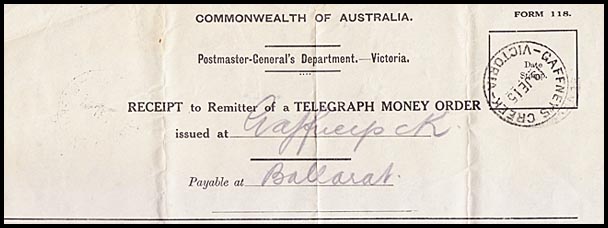 |
| Three formats depending on location of the Order number.
|
 |